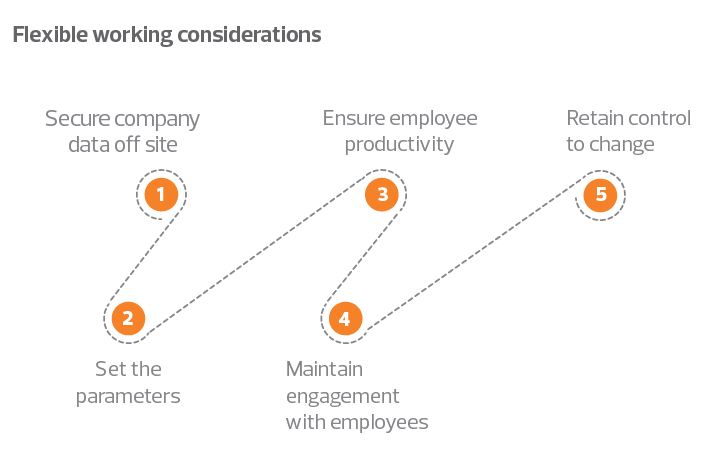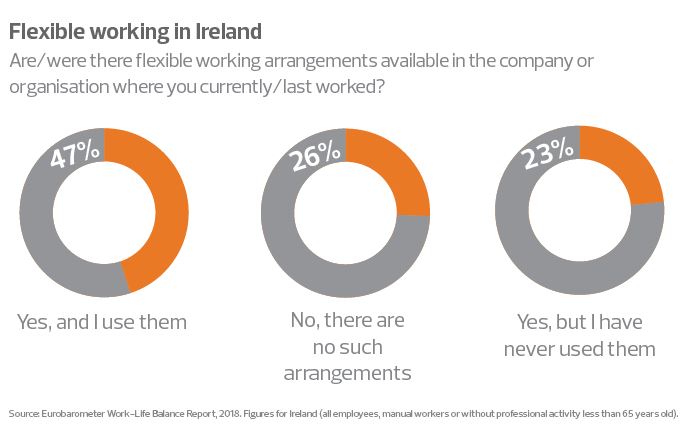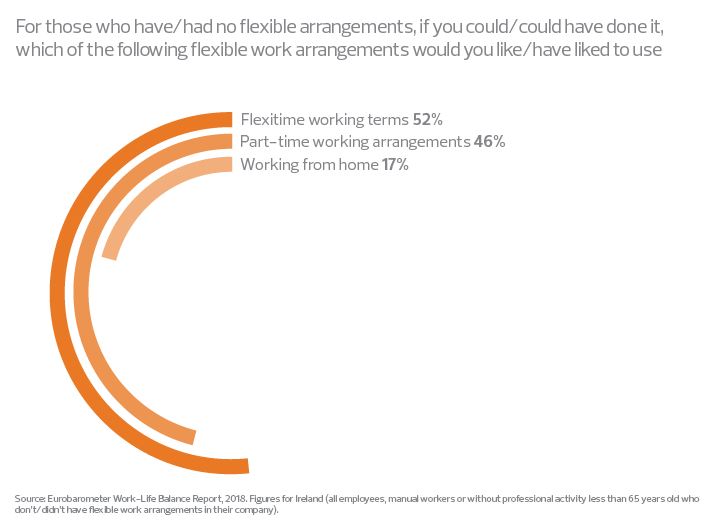
Are you getting the most out of your employees? Or could an overhaul of the traditional work day help you unleash their potential? Research shows giving employees more say over when, how and where they work doesn’t just make them happier, but more productive too.
The combination of a high concentration of multinationals in Ireland and our highly educated, highly productive workforce means that the war for talent here is more competitive than ever. Flexible working options like flexible working hours, compressed hours and remote working could be the factors that win the war, or at least a battle or two.
Today, there is a much clearer business case for flexible working models, such as remote working, variable hours and flexible contracts. Research shows that giving employees greater autonomy can significantly boost performance. Workers are happier, produce more and call in sick less often. Studies even show that flexible working can be a more powerful motivator than financial rewards alone.
Despite the perceived business case for flexible working, research suggests that middle market businesses have been slow to react. While many organisations are exploring the idea of flexible working, they’re not thinking about all options. Most are only focusing on one element of flexibility – either home working, flexible hours or flexible contracts. To be a truly progressive employer, you should be looking at all three.



Kick-start flexible working
You may think flexible working will lead to new challenges. But do it well and you’ll quickly see an uplift in your business culture and performance.
1. Embed a flexible working strategy
The first step is to develop a flexible working strategy that links to your wider organisational strategy. This will enable you to establish a clear business case for your arrangements, allowing everyone from the leadership team to frontline employees to understand how it can support them and help your organisation achieve its long-term goals. It will also encourage the right culture and values to take root, ensuring those who choose flexible options are supported rather than alienated. Your flexible working strategy should be underpinned by a clear communications plan that helps your people understand available options, how they can apply and the reciprocal obligations of greater autonomy.
2. Help managers adapt their leadership skills
Your line managers may be worried about how they can maintain oversight when employees are given more control over when and how they work. Training will give managers the skills they need to find this balance. It should cover how to handle specific requests for flexible working and the broad principles of when and how to check-in with remote employees. Beyond this, it’s good practice to refresh your annual appraisal system. A mid-year review will help managers keep track of their team’s progress towards objectives, giving them the chance to tackle issues before they undermine productivity gains.
3. Anticipate organisational risk
When done well, flexible working can uplift productivity, performance and morale but it can also expose your organisation to risks. It’s important these are understood before embedding your flexible working strategy. Many employees will flourish as a result of their newfound autonomy over their working life but a minority will try to exploit the system. As part of the approval process, managers must ensure employees understand the expectations of your flexible working policy. Remember that flexible workers are also entitled to the same employment rights as those based on-site, such as the obligation to provide a safe place to work and look after their wellbeing. Most importantly of all, don’t overlook the need to manage technology risks by securing remote workers’ systems.
4. Support Families in the Workplace
Households are busier than ever with the majority of households now containing two working parents. With Ireland lagging behind its European counterparts when it comes to affordable childcare many employees are stretched to their limits trying to balance their work and family lives. In fact, 95% of parents admit to feeling overwhelmed at times (Barnardos survey – 2018). Organisations have an opportunity to show their employees that they are valued by giving them what they need - more time. Paid paternity leave and maternity is a good start, but time off to look after a sick child or letting parents come in earlier so that they can get out earlier can make a huge difference. When your employees are able to juggle their commitments better then they feel valued and can be more fully focused and engaged at work, meaning a more productive employee.
5. Boost your employer brand
The ability to offer flexible working practices is one tactic that is available in improving your employer brand – something that is more important than ever in winning the war for talent. Ireland lags behind its EU neighbours considerably when it comes to affordable childcare so a commitment to flexibility could make employees’ lives a lot easier. Don’t underestimate the impact of this when designing your talent acquisition or employee retention strategies.
